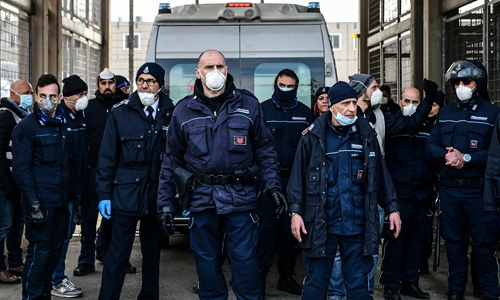A passenger wearing a protective face mask, amid concerns about the COVID-19 outbreak, walks in Linate Airport in Milan, Italy on Sunday. Photo: AFP
Underestimating such a global crisis, in addition to the governments’ struggles in coordinating actions across the continent, would eventually backfire on the future growth and social stability of the region, involving into more social and economic woes, they said.
Such struggles also show that Western countries “are getting lost” in balancing between preventing an economic collapse and protecting public health. They need to immediately shift to prioritizing epidemic control work, as a delayed response and insufficient effort would lead to a disastrous outcome, turning the public health crisis into a political and social one, analysts warned.

Global markets stumbled on Monday as the number of COVID-19 infections rises in the US, while the outbreak continues to worsen in Europe after Italy implemented unprecedented city lockdown measures in the northern part of the country. France and Germany saw confirmed cases in their countries surpass 1,000 just a few days after local officials in Germany ruled out EU-wide travel restrictions, while European countries have not reached a collective and unified effort in fighting the disease.
EU struggles
Such divergence in handling the crisis, amplified by far-right populism in the bloc, has weighed heavily on the effectiveness of the fight against the COVID-19.
The disease has led to 11,998 infection cases in Europe, accounting for 11 percent of total infections worldwide. Outside China, the total number of confirmed cases reached more than 28,000, with 109,695 reported as of Monday globally.
The most-stricken European country, Italy, which is also one of the most fragile economies in the EU, has imposed a lockdown across a large part of the northern areas, putting about 16 million people in quarantine, according to media reports. Another 133 deaths were reported on Sunday, bringing the total to 366, while more than 7,000 infection cases were confirmed in the country, which now has the highest number of fatalities outside China.
Following an emergency meeting led by French President Emmanuel Macron, French Health Minister Olivier Véran announced a ban on public gatherings of more than 1,000 people while protests, exams and public transportation could be exempt from this ban, France24 reported on Sunday.
Officials in Germany have called for the cancelation of large events while preparing measures to boost the economy.
The coronavirus has spread more rapidly in many European countries than at China’s peak, John Ross, a senior fellow at Chongyang Institute for Financial Studies of Renmin University of China, told the Global Times on Monday.
Comparisons in absolute numbers conceal the situation because China’s population is huge. Proportionally, the virus spread more rapidly in European countries than during China’s peak, Ross said.
While China has placed the situation gradually under control following huge sacrifices made by Chinese people ranging from local residents in epicenter Wuhan and Central China’s Hubei Province to medical and military staff, as well as a massive scale of social mobilization, the daily number of new infections has been declining.
The epidemic in Europe and the US is spreading rapidly, prompting some observers and analysts to question those who had harshly criticized China for its missteps at the early stages of the outbreak whether Europe or America could address this issue differently.
Wang Yiwei, director of the Center for European Union studies at the Renmin University of China in Beijing, told the Global Times on Monday that it would be very difficult for EU members to conduct strict epidemic controls and preventive measures like those that China has been taking.
“The EU members face the same threat but they don’t share sovereignty in every aspect and don’t feel the same pain as Italy. So it is very difficult to make every member share the same idea, not only on fighting COVID-19, but also on the immigrant issue and the eurozone debt crisis in the past,” Wang said.
In the face of a huge public crisis, market-driven rules would be distorted and reshape perspectives on different ideologies, especially between the West and East, when the crisis puts individualism and freedom of movement into question, as the free movement of people and goods with weak border controls increases the risks, which is becoming a daunting challenge to EU, as the economy had grown only marginally before the outbreak.
European countries are not united as EU members like Germany and non-EU members like Switzerland have disputed sharing medical materials, and people in countries like Italy are not likely to obey instructions from their own government, and are even reluctant to wear facial masks and stay at home. Some of them even use their political values to criticize China’s effective measures.
Due to these political reasons, adding the new impact of the immigrants or refugees from Turkey, the EU members and even the entire Europe are vulnerable in front of COVID-19, and it doesn’t mean they don’t want to strictly control the outbreak, they are just unable to do so, Wang noted.
Dangerous outcome
If the EU fails to slow down or effectively contain the virus spread, the region will be on the verge of encountering a massive outbreak, which would affect millions and lead to serious consequences, analysts said.
“Europe is not like the US, as the region also faces a significantly aging population who are more vulnerable to the disease,” Song Luzheng, a research fellow at the China Institute of Fudan University in Shanghai, told the Global Times on Monday. Also, the US could act more rapidly in responding to the epidemic, he noted.
The continent is home to the oldest populations in the world where one out of four Europeans is 60 years or over, CNN reported in June 2019, citing a report from the United Nations.
European officials had also been calling for stimulus plans to boost their economies as fears over a looming recession grow. In 2019, the eruzone economy grew at an annualized rate of 1.2 percent, and “at such a low level, it doesn’t take much pressure for economic growth to go flat or negative,” Robert Lind, Capital Group economist in London, said in a research note published on Wednesday.
Despite economic pressure, European countries should understand that the longer it takes them to curb the epidemic spread, the longer it will also take to bring their economic growth back on track, Song noted.
“Containing the outbreak should be the top priority for European countries,” he said.
Analysts also warned that if Europe fails to adopt strict and decisive measures to curb the epidemic, it would be the biggest loser in global economic rivalry to the US and China.


